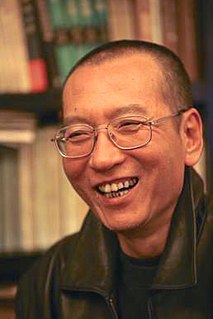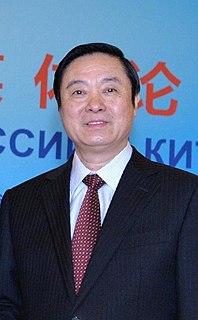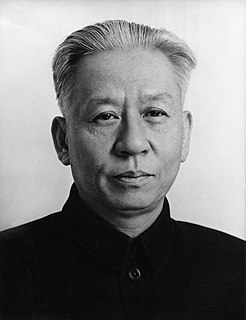Liu Xiaoqing is a Chinese actress and businesswoman. She was one of the leading actresses in China in the 1980s.

Liu Xiaobo was a Chinese writer, literary critic, human rights activist, philosopher and Nobel Peace Prize laureate who called for political reforms and was involved in campaigns to end communist one-party rule in China. He was arrested numerous times, and has been described as China's most prominent dissident and the country's most famous political prisoner. On 26 June 2017, he was granted medical parole after being diagnosed with liver cancer, and died a few days later on 13 July 2017.

Liu Yandong (Chinese: 刘延东; born 22 November 1945) is a retired Chinese politician. She recently served as the Vice Premier of the People's Republic of China, and was a member of the Politburo of the Communist Party of China from 2007 to 2017, a State Councilor between 2007 and 2012, and headed the United Front Work Department of the Communist Party between 2002 and 2007.
The politics of Hebei Province in the People's Republic of China is structured in a dual party-government system like all other governing institutions in mainland China.

Liu Qibao is a Chinese politician. He was a member of the 18th Politburo of the Communist Party of China, a Secretary of the Secretariat, as well as the head of the Propaganda Department of the Central Committee. Previously Liu have served as the party chief of the Guangxi Zhuang Autonomous Region and Sichuan province. He currently serves as one of the vice chairman of 13th Chinese People's Political Consultative Conference.

Ethmia pyrausta is a moth of the family Depressariidae. It is found in northern Scandinavia and adjacent Russia, as well as in China and Mongolia. The species is sometimes referred to as being "mythical", because it is so rarely encountered outside its remote native range. It is scarce resident in the UK and also found occasionally in other areas in Northern Europe.
The Huai Army, named for the Huai River, was a military force allied with the Qing dynasty raised to contain the Taiping Rebellion in 1862. It was also called the Anhui Army because it was based in Anhui province. It helped to restore the stability of the Qing dynasty. Unlike the traditional Green Standard Army or Eight Banners forces of the Qing, the Huai Army was largely a militia army, based on personal rather than institutional loyalties. It was armed with a mixture of traditional and modern weapons. Li Hongzhang, a commander in the Xiang Army, created the Huai Army in October 1861. It succeeded Zeng Guofan’s Xiang Army. The Huai Army itself was succeeded by the New Army and the Beiyang Army, which were created in the late 19th century.
Liu Dongsheng, also known as Tung-sheng Liu, was a Chinese geologist. He graduated from department of geology of National Southwestern Associated University in 1942 and studied at department biology of National Central University from 1946 to 1949. He was a professor at the department of Chemistry, Tsinghua University, Beijing. He was a research fellow at Institute of Vertebrate Paleontology and Paleoanthropology, and then Institute of Geology and Geophysics, Chinese Academy of Sciences.

Ethmia nigroapicella, commonly known as the kou leafworm, is a moth of the family Depressariidae. It is found in Madagascar, the Seychelles, India, Assam, Burma, Samoa, the Philippines, Hawaii, Taiwan, Japan and Australia.

Ethmia is a large genus of small moths. It is the type genus of the gelechioid family Ethmiidae, which is sometimes included in Elachistidae or Oecophoridae as subfamily.

Liǔ is an East Asian surname of Chinese origin found in China, Korea and Japan, as well as in Vietnam of Southeast Asia. It is the 60th name on the Hundred Family Surnames poem.
The Peking Field Force was a modern-armed military unit that defended the Chinese imperial capital Beijing in the last decades of the Qing dynasty (1644–1912).

Liu Shaoqi was a Chinese revolutionary, politician, and theorist. He was Chairman of the NPC Standing Committee from 1954 to 1959, First Vice Chairman of the Communist Party of China from 1956 to 1966 and Chairman of the People's Republic of China, the de jure head of state, from 1959 to 1968, during which he implemented policies of economic reconstruction in China.

Gu Mu (Chinese: 谷牧; pinyin: Gǔ Mù; Wade–Giles: Ku3 Mu4; September 1914 – November 6, 2009) was a Chinese revolutionary figure and politician, who served as the Vice-Premier of the People's Republic of China between 1975 and 1982. As one of Deng Xiaoping's main aides in charge of economic management, he played a major role in implementing Deng's economic reform policies of the 1980s. He was a key figure in the creation of Shenzhen, China's first Special Economic Zone.
Ethmia hunanensis is a moth in the family Depressariidae. It was described by You-Qiao Liu in 1980. It is found in Hunan, China.
Ethmia pingxiangensis is a moth in the family Depressariidae. It was described by You-Qiao Liu in 1980. It is found in Guangxi, China.
Ethmia hainanensis is a moth in the family Depressariidae. It was described by You-Qiao Liu in 1980. It is found in Guangdong, China.
Ethmia menyuanensis is a moth in the family Depressariidae. It was described by You-Qiao Liu in 1980. It is found in Qinghai, China.
Ethmia yunnanensis is a moth in the family Depressariidae. It was described by You-Qiao Liu in 1980. It is found in Yunnan, China.

The president of the People's Republic of China is the head of state of the People's Republic of China. The role of the president alone is largely ceremonial with limited power. However, as a matter of convention, the presidency is held simultaneously by the general secretary of the Chinese Communist Party, who also serves as the chairman of the Central Military Commission, thus is often the paramount leader of China.










